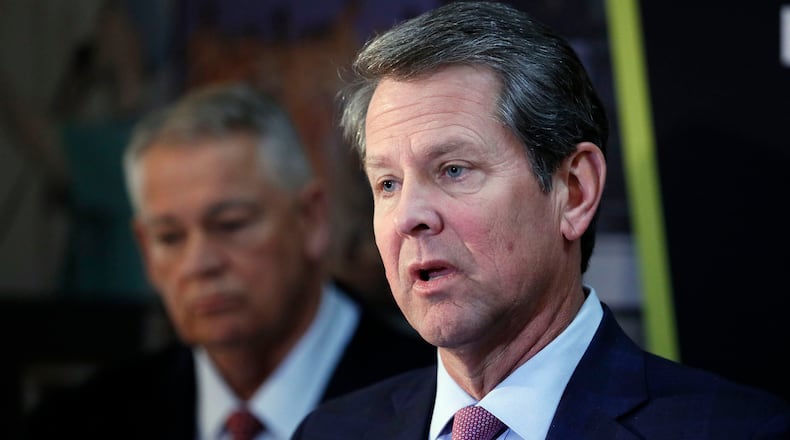A state-funded report released Thursday underscores the challenges that Gov. Brian Kemp faces in crafting a plan to provide more health care coverage to uninsured Georgians without expanding Medicaid, which he has long opposed.
The report by consulting giant Deloitte found that an estimated 1.5 million residents lack health insurance and that Georgia trails other states, even those that also have not expanded Medicaid, in covering low-income residents.
The consultants didn’t include any policy recommendations, but Kemp aides cast it as a road map leading to how Georgia could pursue “waivers” from the Trump administration that could allow the state to seek more federal funding.
“This is the bible moving forward that we’re going to reference,” said Ryan Loke, a health care adviser to Kemp.
It jump-started a political debate over how to better provide coverage for the estimated 15% of the state’s population who lack health insurance, including a disproportionately high number of minorities and young adults.
The findings also stoked new calls to fully expand Medicaid under the Affordable Care Act, which provides coverage for working-age adults who earn up to 138% of the federal poverty line. It found about 666,000 Georgians fit in that category – higher than some previous estimates.
“Georgia has an opportunity to save lives, help rural economies and make a dent in our health care provider shortage - but only by fully expanding Medicaid,” said Stacey Abrams, Kemp’s Democratic opponent in 2018.
"The Deloitte numbers don't lie," she added. "Kemp's half-measures cannot solve a deepening crisis."
And the report could spur politicians to explore new ways to prod smaller businesses to provide coverage to their employees. It showed that 60% of uninsured Georgians over the age of 16 currently have jobs.
"We need to look at incentives for partnerships in a way that encourages people who have no coverage to move into the health care exchange or encourage employers to cover them," said state Sen. Dean Burke, a Bainbridge Republican who is a physician.
He was among a group of dozens of lawmakers, health officials and Kemp administration officials who met Thursday to discuss the report, which includes these findings:
- Georgia's uninsured rate in 2017 was 14.8%, compared with 10.5% nationally. The uninsured rate in some counties, particularly in rural areas, soared above 30%.
- An estimated 28.5% of the population below the poverty line is uninsured – 478,000 people. That rate is higher than the national average of 20% in states that have expanded Medicaid and 26% in states that have not. An additional 190,000 uninsured adults make less than 138% of the poverty line.
- Roughly 27% of young adults, ages 19-34, are uninsured. That's the second-highest uninsured rate for that age bracket in the nation. And 8% of children don't have insurance coverage, above the national average of 5%.
- Minorities are more likely to be uninsured than white residents. About one-third of Hispanic residents and 15% of African Americans have no health coverage, compared with 12% of whites.
- Over one-third of the uninsured population in Georgia is concentrated in five metro Atlanta counties: Clayton, Cobb, DeKalb, Fulton and Gwinnett.
- Seven rural hospitals have closed in Georgia since 2010, the third-highest rate of closures in the nation behind Texas and Tennessee. An additional 26 of the state's remaining 63 rural hospitals are at risk of closure.
‘Wake-up call’
Georgia lawmakers gave Kemp the power to pursue the waivers earlier this year by restoring authority that was stripped from Gov. Nathan Deal in 2014.
His administration hired Deloitte to come up with options, at a cost of roughly $2 million, and set a tight timeline for the waiver process: The governor wants to submit his choice to the federal government by the end of this year.
Kemp has said he's open to several options, including a limited expansion of the Medicaid program and new work requirements for some recipients. His goals, he said, are to lower health care costs, improve quality and protect people with pre-existing conditions.
But he has ruled out a full-scale expansion of Medicaid, saying it's too costly in the long run and that he has no interest in supporting a "broken" Affordable Care Act program.
Democrats, along with some Republican lawmakers, have urged Kemp to seek a broad expansion to provide health care to hundreds of thousands and bolster the state's rural hospitals. Those critics cast a waiver as a flimsy solution.
State Rep. Scott Holcomb, D-Atlanta, said the study was "yet another wake-up call to policymakers" to expand the program.
“For those who advocate waivers, they have their work cut out for them,” he said. “They must demonstrate how waivers will improve outcomes at less cost than full expansion.”
Others sounded an optimistic note. Burke, the Republican legislator, said the data give state officials a new baseline understanding of Georgia’s health care situation.
“We finally have Georgia numbers - not just an opinion,” he said. “We have a challenge ahead, but also a lot of opportunity.”
About the Author
Keep Reading
The Latest
Featured






